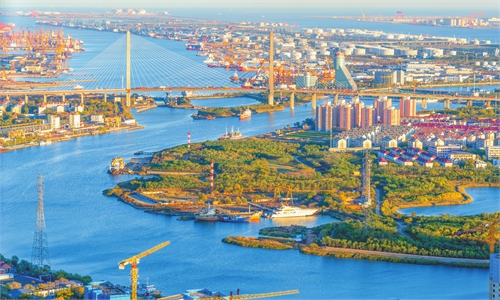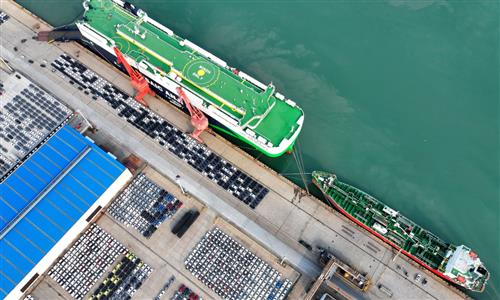
Illustration: VCG
Editor's Note:Despite the outcomes of the recent China-US Geneva talks, there are concerns that relations between the two major powers are far from completely stable. What issues still lie ahead for China-US ties? How should the two countries engage with each other in the next stage? Is there a possibility of a new turning point soon? In the 14th piece of the "Wisdom on China&US" series, David Firestein (Firestein), president and CEO of the George H. W. Bush Foundation for US-China Relations, shared his insights with Global Times (GT) reporter Xia Wenxin regarding recent development and prominent issues in China-US relations.
GT: How do you interpret the significance of the recent China-US Geneva talks? What is your expectation for the future of China-US trade and economic relations?
Firestein: Obviously, I think that was a good result from the standpoint of both countries - the US and China - and frankly, for the world. It allowed us to step back from the brink, from the abyss of these extraordinarily high tariffs, which were essentially tantamount to a trade embargo in both directions. We have now reached a somewhat lower baseline level of tariffs and seemingly come out of Geneva with some momentum to continue discussing the underlying issues and to try to make progress on the substantive challenges that exist on the US-China bilateral trade agenda.
The reason that I think the two sides came together - in particular why the US was willing to have these discussions and make significant concessions - is that these tariffs were fundamentally unsustainable for the US. They would have caused so much damage to the US economy over the coming months and beyond. In that regard, the two sides came together in Geneva, and a good initial result was generated.
But I think we have to keep in mind that all Geneva accomplished was simply rolling back some of those tariffs and undoing some of the damage caused by the tariffs in the first place. So, it's not as if we have made any progress on the underlying issues. It's just that we have undone some of the self-inflicted damage that was done on April 2 and even a little earlier. That's good, but let's understand it for what it is and recognize that the hard work is still in front of us.
GT: You've called the Trump administration's tariff policy "one of the most serious economic policy miscalculations in modern American history." Could you elaborate on this? And what do you think drove that miscalculation?
Firestein: I do think it is definitely one of the most serious economic and trade policy blunders in the history of America. No question about it. It is really a self-inflicted wound - something that didn't have to happen.
First, the tariffs do a lot of bad things for the US economy and for the world economy. From an American perspective, one thing we know about tariffs is that they are inflationary. They raise prices. They are regressive taxes on the American people that hit the poorest Americans harder than they hit the wealthiest Americans, by definition.
Second, they blow out the trade deficit that the US has - specifically, the merchandise trade deficit with China and the rest of the world. From 2018 to 2024, these seven years produced the highest deficits with the [rest of the] world in US history. Tariffs also increase unemployment and cause factories to have to lay off workers, because the goods that those factories produce are more expensive - because the inputs are more expensive, owing to the tariffs.
The final point is that the tariffs, as we know from the last seven years, don't do anything at all to solve the actual trade problems that exist on the China-US bilateral agenda, because if they did solve those problems, then we wouldn't still need the tariffs seven years after they were first implemented.
I think a big reason why the current US administration put this set of policies in place is ignorance of economic policy as well as economic principles and theory. And the other consideration is political. In the US in recent years, it has become convenient and expedient - and it's seen as potent from a political messaging standpoint - to beat up on China and to demonize China.
GT: In a recent interview, you said that even US allies now see China as a more predictable and reliable trade partner. What does China's stability and reliability mean for the rest of the world?
Firestein: I don't think there's any question that China has certainly been more predictable and more stable in terms of its overall policies, whether one agrees or disagrees with China's approach to economics and trade. And I think that stands in sharp contrast to how anyone, including Americans, now looks at the US. There has been an incredible level of volatility and unpredictability, and frankly, inconsistency in US policy, particularly US trade policy. It's absolutely erratic. It's chaotic.
The unpredictability itself is bad because it means that companies don't know where they stand. Foreign trading partners don't know where they stand. And they're not going to be able to make thoughtful, well-informed and economically rational decisions when the policy and legal framework - but particularly the policy - continue to change on a daily basis in the US. That is not a sustainable model. It doesn't do anything good for the US.
GT: Given the current complexity and uncertainty in China-US relations, how real is the risk of a "decoupling" between the two countries? Should the world be concerned?
Firestein: I do think that US-China "decoupling" is simply not feasible in any practical sense, if economic performance, economic rationality and the construct of comparative advantage matter at all to the policymakers involved.
Even with this administration, and even in the wake of so-called Liberation Day, we're now seeing that even the harshest trade hawks in the US are coming to the conclusion, evidently, that decoupling is simply not a feasible option for the US. They're starting to understand that the reality of how the US functions as an economy in the world and the nature of our trade relationship with China are different from what they claimed to understand in the beginning. Now, their actions are starting to give expression to the fact that they realize we were not on a sustainable course.
GT: To stabilize China-US relations, where do you think a breakthrough is most likely to happen?
Firestein: In the US-China trade relationship, the toughest issues are still ahead of us. They're still on the agenda. One of the points I often make is that one of the reasons that China doesn't suddenly morph or transform into an economy that is to the liking of the US - with China doing things exactly the way that the US wants China to do things - is because for that to happen, China would fundamentally have to change its entire system.
As I've said before, that's simply not going to happen.
I am not overly sanguine or optimistic that we're going to see major breakthroughs that fundamentally transform the relationship. But I think there are things that China can do - without changing its system - to recognize the legitimacy of some of the US concerns and complaints. I also think the US can handle trade policy differently and less aggressively than we have in the last several months.
That's what I hope the two governments will do. Achieving this will take patience, perseverance, vision and wisdom, as well as a willingness to compromise on both sides. I think it is possible, and I hope that's what we see going forward.


